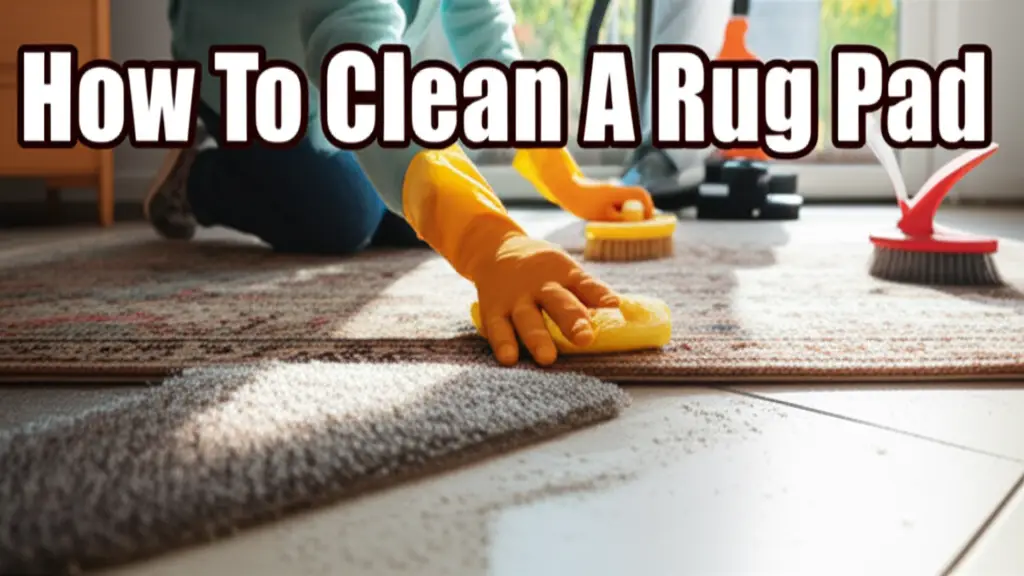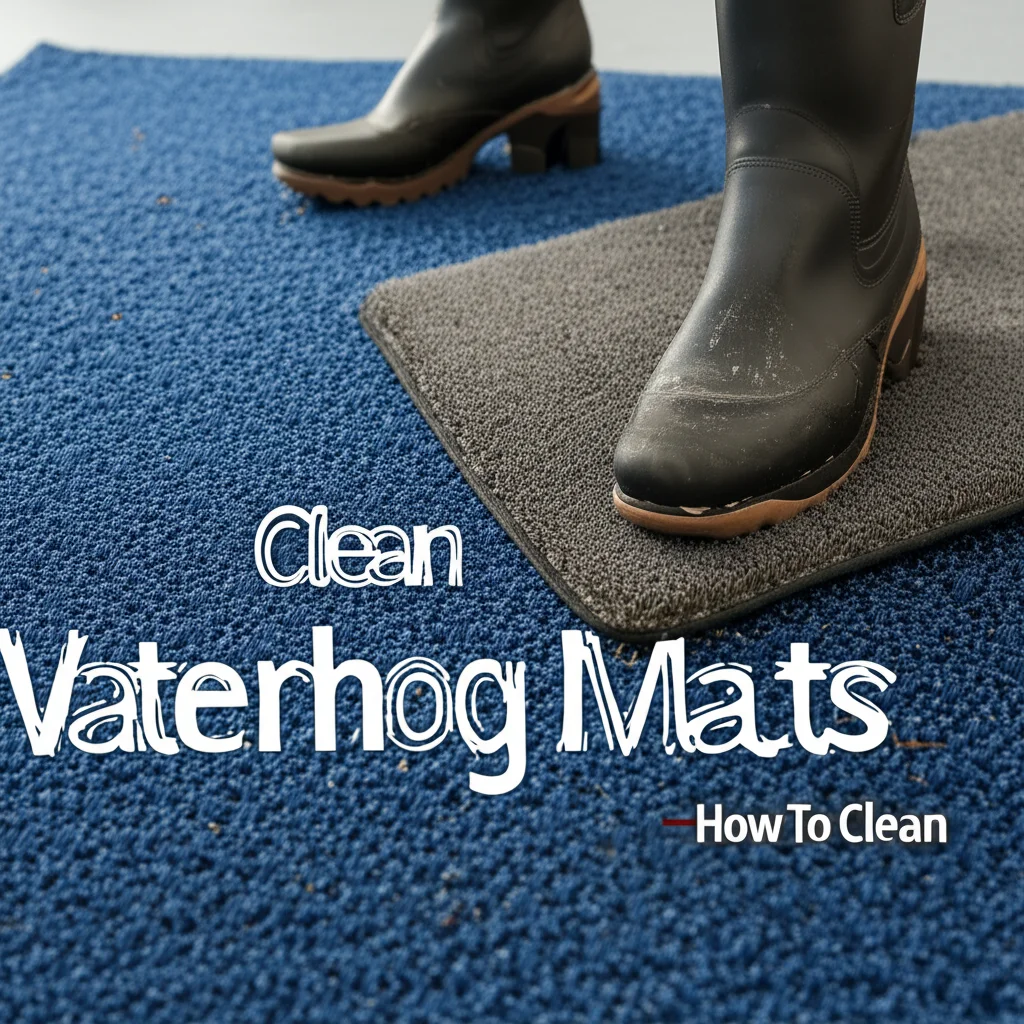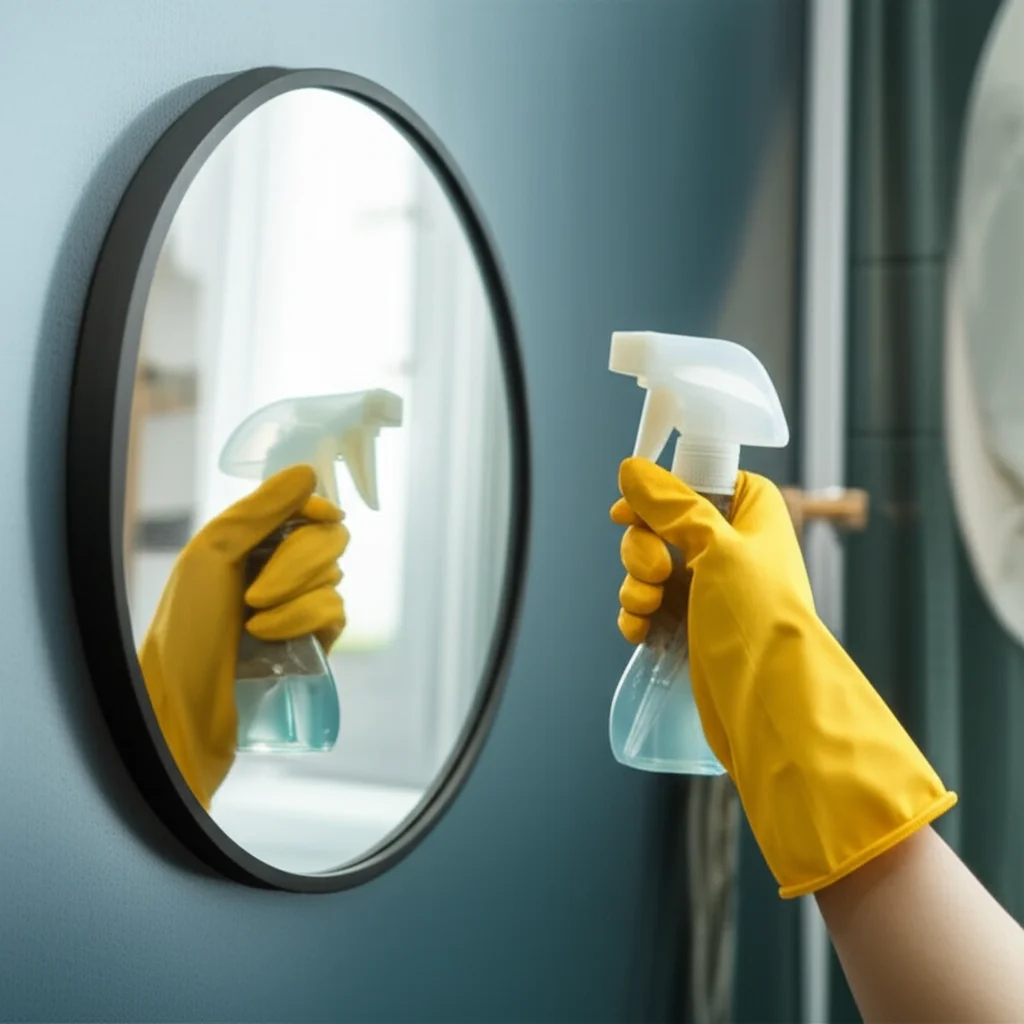· Todd Martin · Home Cleaning · 9 min read
How To Clean A Rug Pad

How to Clean a Rug Pad: Complete Care Guide for Every Type
Rug pads are the unsung heroes of home decor, providing cushioning, preventing slips, and extending the life of your favorite area rugs. However, these hardworking floor protectors often collect dust, dirt, pet accidents, and spills over time. Learning how to clean a rug pad properly can significantly extend its lifespan and maintain a fresh, healthy home environment.
In this comprehensive guide, we’ll explore various methods for cleaning different types of rug pads, from rubber non-slip varieties to felt cushioning pads, including specialized cleaning techniques for common issues like pet accidents.
Key Takeaways
- Different rug pad materials require specific cleaning methods
- Most rug pads can be cleaned with mild soap and water
- Vinegar is effective for deodorizing and disinfecting rug pads
- Allow rug pads to dry completely before replacing them
- Regular cleaning extends the life of both your rug pad and rug
What You Need to Know About Rug Pad Cleaning
Rug pads can absolutely be cleaned, though the specific method depends on the material. Most rug pads require gentle cleaning with mild solutions to avoid damage. Regular maintenance not only extends the pad’s life but also prevents odors and mold growth. For best results, clean your rug pad every 3-6 months or immediately after spills and accidents.
Types of Rug Pads and Their Cleaning Requirements
Rubber and Non-Slip Rug Pads
Rubber and PVC rug pads are popular for their grip and durability, but they require specific care to maintain their non-slip properties.
How to Clean Non-Slip Rug Pads
- Vacuum thoroughly - Remove loose dirt and debris using a vacuum cleaner on both sides.
- Prepare a cleaning solution - Mix mild dish soap with warm water in a bucket.
- Spot clean - Use a soft cloth or sponge dipped in the solution to clean the pad. Avoid saturating it completely.
- Rinse - Wipe down with a clean, damp cloth to remove soap residue.
- Dry completely - Allow the pad to air dry flat on a clean surface before replacing it under your rug.
For stubborn stains or odors, you can learn more about how to clean a rug pad with specialized techniques.
Can You Wash a Rubber Rug Pad in the Washing Machine?
While it might seem convenient, most rubber and non-slip rug pads should not be machine washed. The agitation and heat can break down the rubber, causing it to crumble or lose its grip. For smaller rubber pads, follow these guidelines:
- Only machine wash if the manufacturer specifically states it’s safe
- Use cold water on a gentle cycle
- Skip the spin cycle if possible
- Air dry only - never use a dryer
Felt Rug Pads
Felt pads provide excellent cushioning and insulation but can be more challenging to clean due to their absorbent nature.
How to Clean Felt Rug Pad
- Vacuum thoroughly on both sides to remove dust and debris
- Treat stains immediately - Blot (don’t rub) liquid spills with absorbent cloths
- Spot clean with a mixture of mild soap and water using a soft brush
- Disinfect by spraying lightly with a solution of equal parts water and white vinegar
- Dry completely - Air dry flat in a well-ventilated area before replacing
For persistent odors in felt pads, sprinkle baking soda liberally over the surface, let it sit for several hours (or overnight), then vacuum thoroughly. This helps absorb unwanted smells without damaging the pad material.
If you’re dealing with wool rugs on top of your felt pad, you might want to check out how to clean a wool rug to ensure your entire floor covering system stays in top condition.
Specialized Rug Pads (Ruggable)
Ruggable pads have gained popularity for their machine-washable designs. These specialized pads have unique cleaning requirements to maintain their Velcro-like attachment systems.
How to Clean Ruggable Pad
- Remove the rug cover completely from the pad
- Vacuum the pad surface to remove hair and debris
- Spot clean small stains with mild soap and water
- Machine wash when necessary:
- Use cold water on a gentle cycle
- Mild detergent only (no bleach)
- No fabric softener (reduces grip)
- Air dry completely - never put in a dryer
- Ensure complete drying before reattaching the rug cover
For tips specifically about Ruggable pad maintenance with pets, many users have shared their experiences on forums. According to popular Reddit discussions on how to clean Ruggable pad, the key is immediate action when accidents happen.
How to Clean a Rug Pad with Vinegar
Vinegar is an excellent natural cleaner for rug pads due to its disinfecting and deodorizing properties. Here’s how to use it effectively:
- Create a vinegar solution - Mix equal parts white vinegar and water in a spray bottle
- Test in an inconspicuous area first to ensure no discoloration
- Spray lightly over the rug pad surface - don’t saturate
- Let sit for 10-15 minutes to kill bacteria and neutralize odors
- Blot excess moisture with clean towels
- Rinse by wiping with a clean, damp cloth
- Air dry completely before replacing under your rug
This method is particularly effective for eliminating pet odors and disinfecting without harsh chemicals. For persistent odors, you can add a few drops of essential oil like lavender or tea tree to the vinegar solution for additional freshening power.
If you’re dealing with natural fiber rugs, you might want to check out specialized cleaning techniques for bamboo rugs or sisal rugs to maintain your entire floor covering.
Dealing with Pet Accidents on Rug Pads
Pet accidents pose a particular challenge for rug pads, as urine can soak through and cause persistent odors if not properly cleaned.
How to Clean Rug Pad Dog Pee
- Act quickly - The sooner you clean it, the better the results
- Blot up excess liquid with absorbent cloths or paper towels
- Neutralize the urine with an enzymatic pet cleaner that breaks down urine components
- Rinse thoroughly by blotting with clean water
- Disinfect with a vinegar solution (equal parts vinegar and water)
- Deodorize with baking soda - sprinkle liberally, let sit overnight, then vacuum
- Dry completely before replacing the rug
For severe cases where urine has soaked deeply into the pad, you may need to replace the pad entirely, as the odor and bacteria can be difficult to completely eliminate.
Many pet owners have shared successful cleaning methods for Ruggable pads with dog pee, with enzymatic cleaners being the top recommendation.
Deep Cleaning Methods for Different Rug Pad Types
When spot cleaning isn’t sufficient, you may need to deep clean your rug pad. Methods vary by material:
Deep Cleaning Non-Slip Rubber Pads
- Lay the pad flat in a bathtub, shower stall, or on a clean driveway
- Prepare a cleaning solution - Mix mild dish soap with warm water
- Gently scrub with a soft brush in circular motions
- Rinse thoroughly with clean water
- Remove excess water by pressing with towels
- Dry completely - hang over a shower rod or lay flat in a well-ventilated area
Deep Cleaning Felt Pads
- Vacuum thoroughly to remove debris
- Mix a gentle cleaning solution - mild wool detergent with cool water
- Clean in sections using a soft cloth dampened (not soaked) with the solution
- Blot with clean water to remove soap residue
- Press with towels to remove moisture
- Air dry completely - may take 24-48 hours depending on thickness
If you’re also cleaning bathroom rugs, you might want to check out specialized techniques for cleaning bathroom rugs to maintain hygiene throughout your home.
Maintenance Tips to Extend Rug Pad Life
Regular maintenance can prevent the need for deep cleaning and extend the life of your rug pad:
- Vacuum regularly - Both the rug and pad (when exposed) should be vacuumed weekly
- Rotate your rug and pad every 6 months to ensure even wear
- Address spills immediately to prevent staining and odors
- Air out periodically - Remove the rug and pad and allow them to breathe for a day every few months
- Use appropriate cleaning methods for your specific pad material
- Keep pets’ nails trimmed to prevent tearing or catching on the pad
- Check manufacturer’s guidelines before using any cleaning products
For high-traffic areas, consider using washable rug pads that are specifically designed for frequent cleaning.
When to Replace Your Rug Pad
Even with diligent cleaning, rug pads will eventually wear out. Signs it’s time for replacement include:
- Thinning or compression that doesn’t recover
- Crumbling or disintegration of material
- Persistent odors despite thorough cleaning
- Visible mold or mildew that won’t clean away
- Loss of grip or non-slip properties
- Visible wear patterns or tears
Most quality rug pads last between 5-10 years depending on use, but this timeline shortens in high-traffic areas or homes with pets and children.
FAQ: Common Questions About Cleaning Rug Pads
Can rug pads be cleaned?
Yes, most rug pads can and should be cleaned regularly. The specific cleaning method depends on the pad material, with options ranging from spot cleaning to full washing for some types. Regular cleaning extends the pad’s life and maintains a healthier home environment.
How do you get urine out of a rug pad?
For urine stains, first blot up excess liquid, then use an enzymatic cleaner specifically designed for pet accidents. Follow with a vinegar solution to disinfect, and finally sprinkle baking soda to absorb odors. Always ensure the pad dries completely before replacing it.
How often should you clean a rug pad?
For general maintenance, vacuum your rug pad every 1-2 months when you clean your rug. Deep clean every 6-12 months, or immediately after spills or pet accidents. High-traffic areas may require more frequent cleaning.
Are there washable rug pads?
Yes, some rug pads are specifically designed to be washable. Ruggable pads and certain synthetic options can be machine washed. Always check the manufacturer’s instructions before washing any rug pad in a machine.
Can I use a steam cleaner on my rug pad?
Steam cleaning is not recommended for most rug pads. The heat and moisture can damage adhesives in rubber pads and cause felt pads to shrink or warp. Stick to the recommended cleaning methods for your specific pad type.
How do I remove mold from a rug pad?
If you discover mold on your rug pad, take it outside, vacuum thoroughly, then clean with a solution of one part hydrogen peroxide to five parts water. For severe mold issues, replacement is often the safest option, especially for felt pads.
Can I use bleach on my rug pad?
Avoid using bleach on rug pads as it can damage the material, cause discoloration, and break down rubber components. Instead, use vinegar or hydrogen peroxide for disinfecting, which are effective yet gentler alternatives.
Final Words
Proper rug pad cleaning is essential for maintaining a healthy home environment and extending the life of both your rug and its pad. By following the specific cleaning methods recommended for your type of rug pad—whether it’s rubber non-slip, felt, or a specialized Ruggable pad—you can ensure it continues to provide the protection and comfort you need. Remember that regular maintenance prevents the need for intensive cleaning and helps avoid premature replacement.
Don’t overlook this important aspect of home care; a clean rug pad contributes significantly to indoor air quality and the longevity of your floor coverings. Whether you’re spot cleaning with vinegar, addressing pet accidents, or performing routine maintenance, the time invested in proper rug pad care will pay off with years of additional service from these essential home accessories.
For more information on caring for your floor coverings, explore our guides on how to clean various rug types to maintain a fresh, clean home from the ground up.
- rug care
- floor protection
- cleaning tips
- rug pad maintenance
- home maintenance




